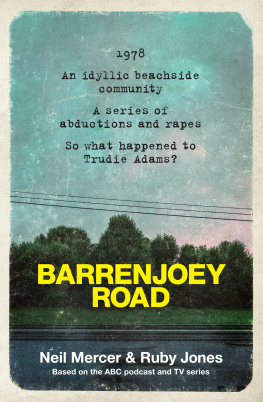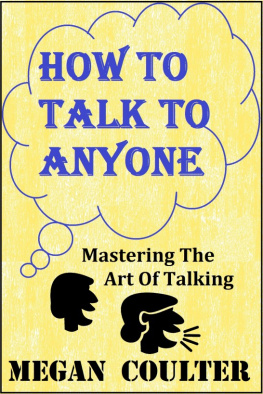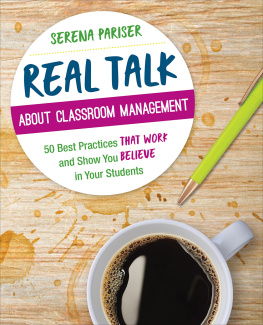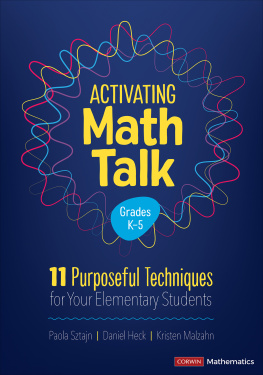Exploring Talk in Schools
Exploring Talk in Schools
Inspired by the Work of Douglas Barnes
edited by
Neil Mercer
and
Steve Hodgkinson

Introduction and Editorial Arrangement Neil Mercer and Steve Hodgkinson 2008
Douglas Barnes 2008
Phil Scott 2008
Kathryn M. Pierce and Carol Gilles 2008
Neil Mercer and Lyn Dawes 2008
Yvette Solomon and Laura Black 2008
Robin Alexander 2008
Judith Green, Beth Yeager and Maria Castanheira 2008
Frank Hardman 2008
Courtney Cazden 2008
Gordon Wells and Tamara Ball 2008
First published 2008
Apart from any fair dealing for the purposes of research or private study, or criticism or review, as permitted under the Copyright, Designs and Patents Act 1988, this publication may be reproduced, stored or transmitted in any form, or by any means, only with the prior permission in writing of the publishers, or in the case of reprographic reproduction, in accordance with the terms of licences issued by the Copyright Licensing Agency. Enquiries concerning reproduction outside those terms should be sent to the publishers.
SAGE Publications Ltd
1 Olivers Yard
55 City Road
London EC1Y 1SP
SAGE Publications Inc.
2455 Teller Road
Thousand Oaks, California 91320
SAGE Publications India Pvt Ltd
B 1/I 1 Mohan Cooperative Industrial Area
Mathura Road
New Delhi 110 044
SAGE Publications Asia-Pacific Pte Ltd
33 Pekin Street #02-01
Far East Square
Singapore 048763
Library of Congress Control Number 2008923545
British Library Cataloguing in Publication data
A catalogue record for this book is available from the British Library
ISBN 978-1-84787-378-1
ISBN 978-1-84787-379-8 (pbk)
Typeset by C&M Digitals (P) Ltd., Chennai, India
Printed in Great Britain by T. J. International Ltd, Padstow, Cornwall
Printed on paper from sustainable resources

Contents
Steve Hodgkinson and Neil Mercer
Douglas Barnes
Phil Scott
Kathryn M. Pierce and Carol Gilles
Neil Mercer and Lyn Dawes
Yvette Solomon and Laura Black
Pedagogy Robin Alexander
Judith Green, Beth Yeager and Maria Castanheira
Frank Hardman
Courtney Cazden
Gordon Wells and Tamara Ball
Contributors
Robin Alexander
Fellow of Wolfson College, University of Cambridge
Professor of Education Emeritus, University of Warwick
Director of the Primary Review
Faculty of Education
University of Cambridge
United Kingdom
Tamara Ball
Ph.D. Candidate, Education Department
Faculty of Social Sciences
University of California at Santa Cruz
United States of America
Douglas Barnes
Former Reader in Education
School of Education
University of Leeds
United Kingdom
Laura Black
Lecturer in Literacy
School of Education
University of Manchester
United Kingdom
Maria Lucia Castanheira
Faculdade de Educao
Universidade Federal de Minas Gerais
Brazil
Courtney B Cazden
Charles William Eliot Professor of Education, Emerita
Harvard Graduate School of Education
Harvard University
United States of America
Lyn Dawes
Senior Lecturer in Education
School of Education
University of Northampton
United Kingdom
Carol Gilles
Associate Professor of Reading and Language Arts
College of Education
University of Missouri-Columbia
United States of America
Judith Green
Professor of Education
Gevirtz School of Education
University of California at Santa Barbara
United States of America
Frank Hardman
Professor in Educational Studies
Centre for Language Learning Research
School of Education Studies
University of York
United Kingdom
Steve Hodgkinson
Research Fellow
Department of Psychiatry and Psychotherapy
University Hospital Ulm
Germany
Neil Mercer
Professor of Education &Fellow of Hughes Hall
Faculty of Education
University of Cambridge
United Kingdom
Kathryn Mitchell Pierce
Writing Instructional Support Specialist
Wydown Middle School
Clayton, Missouri
United States of America
Phil Scott
Professor of Science Education
School of Education
University of Leeds
United Kingdom
Yvette Solomon
Reader
Department of Educational Research
Lancaster University
United Kingdom
Gordon Wells
Professor of Education
Faculty of Social Sciences
University of California at Santa Cruz
United States of America
Beth Yeager
Director, Center for Education Research
Gevirtz Graduate School of Education
University of California at Santa Barbara
United States of America
Introduction
Steve Hodgkinson and Neil Mercer
One could be forgiven for thinking that the single greatest challenge facing children as they grow up in the twenty-first century is how they can become productive members of an increasingly technological society. Certainly many school curricula reflect the importance placed on children understanding the application of innovation, technology and their interconnectedness in our global society. That said, we perhaps take too much for granted a more fundamental aspect of the human condition: our use of language, principally speech, to communicate with each other. This is particularly important in the formative years of our development, including the many years we spend as children in school.
Classroom talk, by which children make sense of what their peers and teachers mean, has been the subject of school-based educational research for more than forty years now. In that time, its significance has been redefined as individualistic, cognitive theories of learning gave way to more social, culturally located interpretations of learning. It is now appreciated that classroom talk is not merely a conduit for the sharing of information, or a means for controlling the exuberance of youth; it is the most important educational tool for guiding the development of understanding and for jointly constructing knowledge. As the chapters in this book will make clear, research has provided a wealth of good reasons why policy makers and teachers should give more attention to improving the quality of classroom talk.
More than thirty years ago, when this field of research was still in its infancy, Douglas Barnes wrote From Communication to Curriculum, a succinct account of the kinds of classroom talk he observed in a Leeds secondary school. He noted that often the odds were stacked against pupils being able to use talk productively in the classroom, because of the rigid and formalised way teachers required children to engage in dialogue. Since then, the book has become a core text for the more enlightened initial teacher education courses, and the clear but profound message that it conveyed has reverberated across time. Today, the relevance of the ideas expressed in it is an enduring legacy of the work of Douglas Barnes, and a source of inspiration for the many educationalists who have adopted his ideas in their own work.
In this book, we have gathered together some of those leading educationalists who have been inspired by Douglass work, and asked them to write about their own work on classroom talk. In doing so, we have been conscious of the need to bridge what often seems like a vast conceptual gulf between practitioners and researchers a gulf that Douglas bridged so well. Hence, each of the contributions locates the research firmly within the practice of classroom teaching, and outlines practical steps that may be taken to develop effective classroom interaction in many different contexts.










